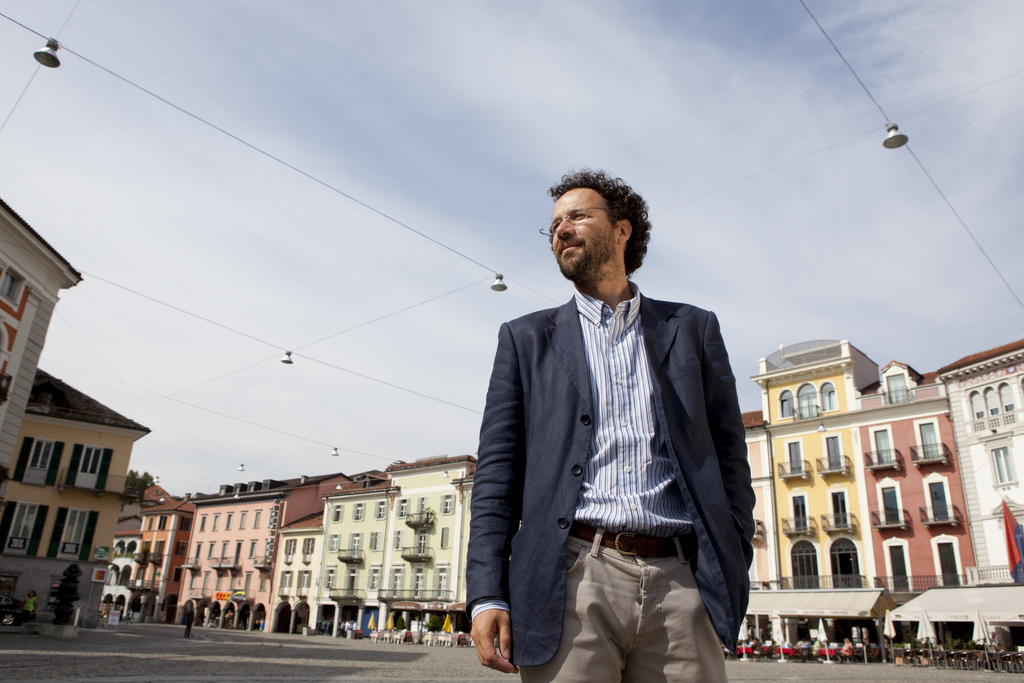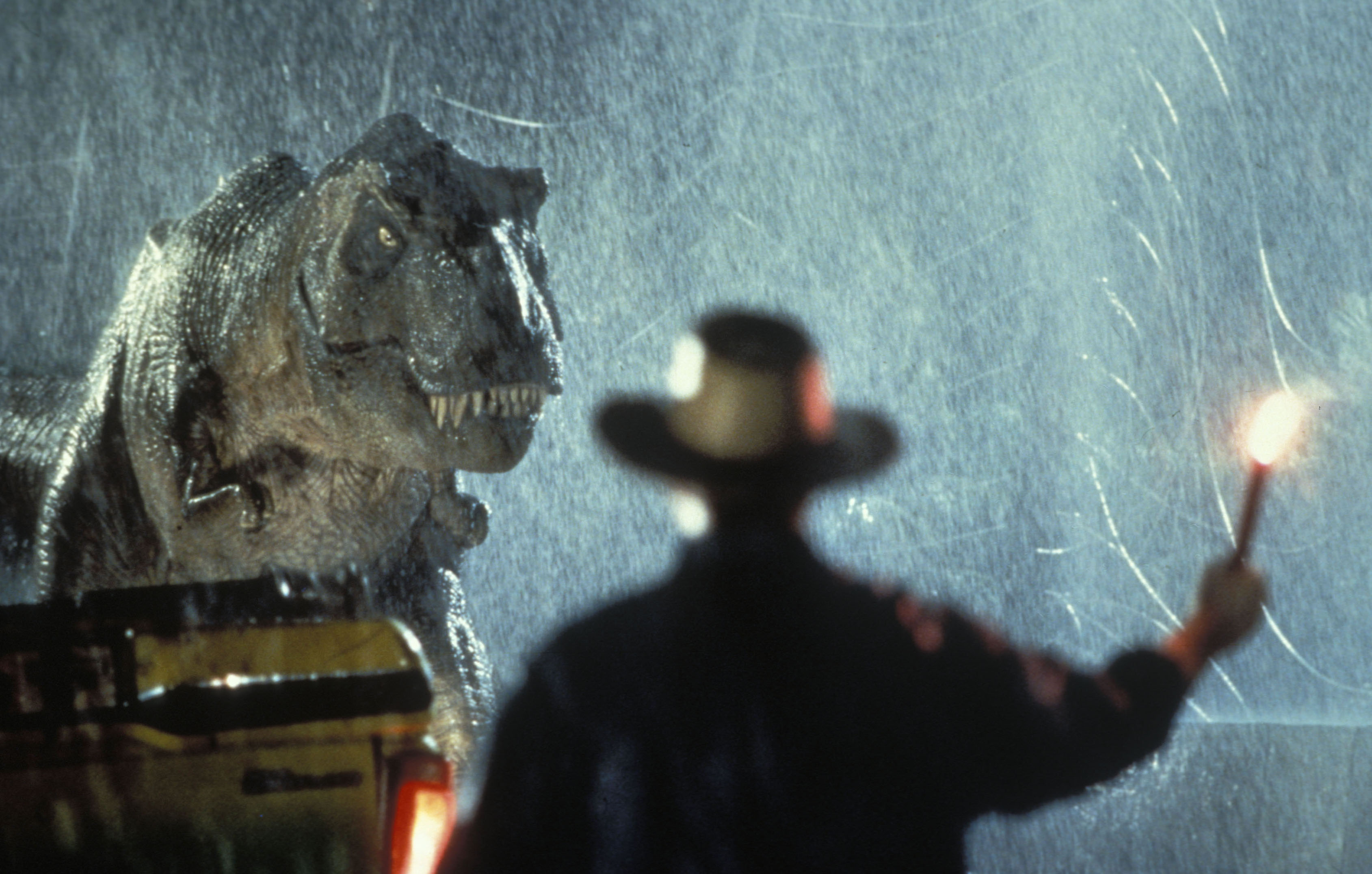An intellectual without borders

Carlo Chatrian is getting ready for his first Locarno Film Festival as artistic director – followed for half a day by swissinfo.ch. It soon becomes clear that this is someone who is chatty, relaxed, single-minded – and above all keen to meet the public.
I’ve arranged to meet Chatrian in front of his pied-à-terre, a stone’s throw from the Piazza Grande, the heart of the film festival, where some 8,000 people gaze at the largest outdoor cinema screen in Europe.
An anonymous, unprepossessing flat, he explains, discouraging me from coming up. This is where he sleeps, works until the early hours – and misses the coolness of home, in a mountain village in the Aosta Valley just the other side of the Italian border.
At 7.30am on the dot he comes out of the main door; a rucksack over his shoulder and a bag of rubbish in his hand for the bin men.
Pragmatic, Chatrian doesn’t appear to care much about etiquette. The privilege of artists? Or intellectuals? That’s how the press loves to define him, whether it’s his refined way of talking, his degree in literature and philosophy or his casual style.
He smiles, slightly embarrassed. “It must be my glasses – my children also make fun of me because of them,” he says. As if wanting to justify himself, he adds that every Wednesday he plays football with his friends. “That’s hardly befitting of an intellectual, is it?”
Walking briskly towards his office, we go over what I want to do. “You want to spend half a day looking over my shoulder, is that right? But you’re not going to be asking questions all the time – I’ve got work to do,” he says half-jokingly, half worried.
Chatrian doesn’t have time to waste – and besides, sitting around twiddling his thumbs isn’t really his style. Is he hyperactive? “Maybe slightly nervous.”

More
‘Maybe films should be subtitled in SMS language!’
“Dream machine”
Journalist, critic and film programmer, the 42-year-old was named artistic director at Locarno in September 2012, after the surprise resignation of Olivier Père.
Nevertheless, he’s not a new face, having arrived at the festival in 2002. From 2006 to 2009 he was part of the selection committee and has recently been in charge of the retrospectives.
As a young boy, he would watch films on television, like everyone. But his passion for cinema goes back to his time at university and the lightning bolt of Hiroshima mon amour, Alain Resnais’s 1959 study of memory and forgetfulness.
A “revelation”, is how Chatrian describes the film. “For me, cinema is a dream machine. Sometimes these dreams are very similar to reality, sometimes less so. They can be a key to understanding who we are – or simple, meaningless entertainment. That’s what fascinates me.”
He says a range of films have touched him. Is there a particular genre that fascinates him, I wonder. He bursts out laughing. Wrong question!
“I don’t know why you journalists have this bee in your bonnet. I grew up at a time when the very concept of cinematic genres was crumbling. For me, cinephilia – a term which might make people smile – is really this ability to transcend genres.”
Indeed, his festival is a bit like this – straddling past and present, genres, languages and cultures. Not for nothing has he defined it as “without borders”.
Carlo Chatrian, artistic director of the Locarno film festival, was born in Turin on December 9, 1971.
He has a degree in literature and philosophy, specialising in journalism and communication and is both a journalist and an author.
He has written biographies and monographs on such directors as Errol Morris, Wong Kar Wai, Johan Van Der Keuken, Frederick Wiseman, Maurizio Nichetti and Nicolas Philibert.
From 2001 to 2007 Chatrian was deputy director of the Alba Film Festival in Italy, and a member of the selection committee of the “Festival dei Popoli” in Florence and the “Visions du Réel” festival in the Swiss city of Nyon.
He has also worked as artistic director at the “Cinéma du réel” festival in Paris, the “Courmayeur Noir In Festival” and at the national cinema museum in Turin.
Chatrian started working with the Locarno film festival in 2002; from 2006 to 2009 he was a member of the selection committee.
For the past five Locarno festivals he has curated the retrospectives (Nanni Moretti, Manga Impact, Ernst Lubitsch, Vincente Minnelli, Otto Preminger).
He became a consultant for the Swiss cinema archive in 2010, but had to give this up on his appointment as artistic director of the Locarno festival in September 2012.
“Not a tyrant”
We meet on a Thursday at the end of July with only a few days to go before his debut on the Piazza Grande. The programme has been released and the critics seem enthusiastic. A few names are still missing, however – maybe a surprise or two – and there are those precious little details to take care of.
He asks for about an hour to finish his introductions for films, actors and directors: Werner Herzog, Christopher Lee, Sergio Castellitto, Anna Karina…
“Sometimes I manage to write it all in one go, but normally I need peace and quiet to gather my thoughts. And I have to fight against the tendency to get all abstract and theoretical,” he says.
I take advantage of his request and have a look around. A sofa, two festival posters on the wall, a partially filled bookcase – “they all belong to my predecessor, mine are still at home.” The office is tidy without being sterile.
At nine, the whirlwind of chores begins: proofreading the programme, laying out the festival magazine – and then there’s trying to plan the diary, juggling interviews, cocktail parties and above all the soul of festival: meeting directors, actors and the public.
He glances around restlessly, from documents to his computer, phone and diary. All of a sudden he stops and looks me straight in the eye.
His staff come and go. He sometimes gets worked up, with the directness of someone who knows what they want and isn’t afraid to say so. “Normally that soon passes – I don’t think I’m a tyrant, but perhaps you should ask my colleagues…”
Globetrotter
It just so happens that today is the day that the Venice Film Festival has released its programme. He can’t help looking.
“Ah, I’ve also seen many of these films,” he murmurs. Did any of them slip through his net?
“I would have liked a couple of them at Locarno – but those are the rules of the game. People who work at festivals are more like partners than rivals. We all share the same passion for cinema and sometimes exchange valuable information. Competition exists, but it’s healthy.”
Chatrian has spent the past year travelling around the world and watched more than 1,000 films in the search of titles to fill his programme. Are there any trends at the moment?
“Probably the issue of family and identity, but also memory,” he says, adding that for his first festival he didn’t want a revolution.
“Since 2001, the festival has had four artistic directors and what it needs now above all is continuity. It will be for the public and critics to say in what way I’ve made my impression. The programme is there for everyone.”
He stresses, however, that he sees festival directors as people who put the films in the spotlight “and not themselves”.
That said, on August 7, there could be 8,000 people waiting for him on the stage in the Piazza Grande. But he denies being afraid. “Why should I be? I don’t want to sound full of myself, but we’ve worked hard for a whole year for this moment. At most there’s a bit of tension – and above all a great desire to meet our audience.”
International Competition: There are 20 films, 18 of them world premieres, in the running for the Golden Leopard.
Three of them are Swiss: “Mary, Queen of Scots” by Thomas Imbach, “Tableau noir” by Yves Yersin (documentary) and “Sangue” by the Italian director Pippo Delbono (co-production with Swiss Italian television).
Piazza Grande: 16 films, including two Swiss coproductions: Jean-Stéphane Bron is bringing his documentary “L’expérience Blocher” to Locarno, while Lionel Baier is presenting “Les grandes ondes (à l’Ouest)”.
The Leopard of Honour this year goes to the German director Werner Herzog, while the Retrospective is dedicated to the work of George Cukor (1899-1983).
Those expected on the red carpet include: Christopher Lee, Victoria Abril, Anna Karina, Sergio Castellitto, Otar Iosseliani, Jacqueline Bisset and Faye Dunaway.
(Translated from Italian by Thomas Stephens)

In compliance with the JTI standards
More: SWI swissinfo.ch certified by the Journalism Trust Initiative

You can find an overview of ongoing debates with our journalists here. Please join us!
If you want to start a conversation about a topic raised in this article or want to report factual errors, email us at english@swissinfo.ch.